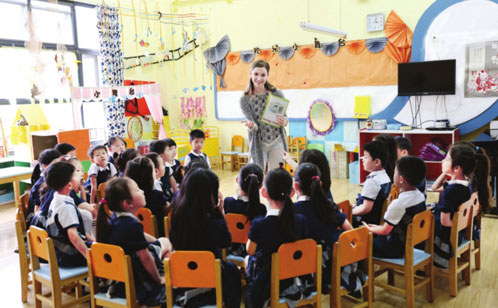Canadian teachers implementing new kindergarten teaching model
This is a typical day in SIP Future City Kindergarten (SIPFCK): foreign teachers greet children in English, write the teaching plan in English, play games with children and evaluate their development in English, while their Chinese counterparts offer whatever help is needed in the process.
The children cannot understand foreign teachers without Chinese teachers' interpretation when they first enter the kindergarten, but they will feel comfortable with the English classes and can speak everyday English after only one school term.

This is the Canadian teaching model newly introduced by SIPFCK this year in a bid to explore the new pattern of pre-school education.
Established in September, 2010, SIPFCK is now capable of accommodating 800 children. "More and more parents are yearning for the pre-school education model in developed countries, and are especially keen on their children’s acquisition of bilingual competence," said Gu Jie, curator of SIPFCK.
E. J. Preschool Education Group, the kindergarten's mother company, purchased Toronto First Kindergarten, a subsidiary of Seneca College, at the beginning of this year to offer SIPFCK children the best early education of Canadian model and teaching methodology.
Currently, domestic kindergartens generally adopt the topic-oriented teaching model and finish one topic within three to four weeks. In contrast, Canadian kindergartens lay more emphasis on exploratory learning and the application of knowledge; their learning and teaching is based on children's interest and one topic lasts for around two months.
The foreign teachers in SIPFCK speak English only and they use English for communication in daily life, classes, games, etc., which makes English acquisition quite natural for the children.
At present, SIPFCK boasts nine Canadian teachers who all have pre-school education diplomas, Canadian kindergarten teacher qualifications and three year-plus early education working experience.
Newcomer Deborah joined SIPFCK this autumn. "I have 15 kids in my class. I would observe every kid first and teach accordingly. The Chinese children are more disciplined and quieter, and I'm working hard to activate their learning potential," said Deborah, adding, "Parents don't have to worry that their kids don't understand English. Actually pre-schoolers pick up English more quickly, and many of them can understand my classes in two months."
According to Gu Jie, the kindergarten management will continue to improve the feasibility of the Canadian teaching model and try to localize it as soon as possible. They will also develop kindergarten-based curriculum and extend it from the current international class to regular class step by step.
Source: Suzhou Daily, Nov. 14, 2016